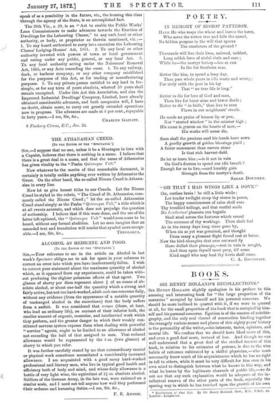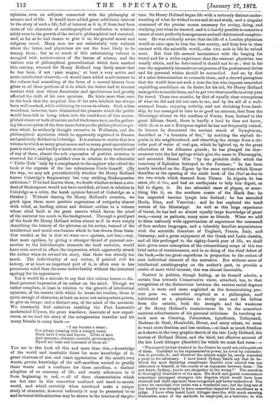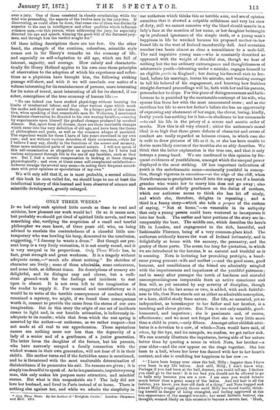BOOKS.
SIR HENRY HOLLAND'S RECOLLECTIONS.*
SIR HENRY HOLLAND slightly apologizes in his preface to this amusing and interesting book for " the large proportion of the narrative" occupied by himself and his personal concerns. We should be more inclined to quarrel with it, if we were to quarrel at all, for the small proportion of the book that is occupied by him- self and his personal concerns. Egotism is of the essence of autobio- graphy, and the only real thread of connection binding together the strangely various scenes and places of this eighty years' history is the personality of the writer,—his interests, tastes, opinions, and mental life. We confess that we should have liked more of this, and even a good deal more, instead of less. And though we can well understand that a great deal of the studied reserve of this book, in relation to his estimates of persons, is due to the wise habits of reticence cultivated by a skilful physician,—who must necessarily know much of his acquaintances which he has no right to tell to others, while it must be very difficult for him even in his own mind to distinguish between what he knows in this way, and what he learns by the legitimate channels of public life,—we do not see that any such explanation would be adequate of the in- tellectual reserve of the other parts of the book, especially the sparing way in which he has touched upon the growth of his own
• Recollections of Paul Life. By Sir Henry Holland, Bart, M.D., F.ILS., London : Longmans.
opinions, even on subjects connected with the philosophy of science and of life. It would have added great additional interest to the story of such a life, full of interest as it is, if there had been more of the character of autobiographical confession in relation solely even to the growth of the writer's philosophical and cosmical, and, so far as he had chosen to give it us, his general moral and religious creed. Many men are not unnaturally very reticent about the latter, and physicians are not the least likely to be among them ; but as so much of this entertaining volume is occupied with reminiscences of the heroes of science, and the various eras of philosophical generalization which have marked this century, whereof Sir Henry Holland may fairly assert that he has been, if not pars magna,' at least a very active and acute intellectual observer,—it would have added much interest to the volume had something of the form of a mental history been given to all those portions of it in which the writer had to recount contact with men whose discoveries and speculations had greatly affected the drift of his own opinions. He hints more than once in the book that the sceptical bias of his own intellect has always been well marked, while criticizing its excess in others. Such a bias would not, however, have diminished the pleasure which the public would have felt in being taken into the confidence of this accom- plished observer both of nature and of the human race, and in gather- ing his conception of the true mean between the philosophical scepti- cism which he evidently thought excessive in Wollaston, and the philosophical mysticism which he apparently regretted in Bunsen and positively disliked in Coleridge. It is curious to notice that in a volume in which so many great names and so many great speculations pass in review, and hardly a harsh or even a depreciatory word is said of any of them, almost the sole expression of positive aversion is reserved for Coleridge, qualified even in relation to the admirable " Table-Talk " only by a compliment to the nephew who edited the book at the expense of the too voluminous Uncle himself. (By the way, we may ask parenthetically whether Sir Henry Holland knows Coleridge's fragmentary but very striking Shakespearian criticisms ? If he had known them, we doubt whether so keen a stu- dent of Shakespeare would not have modified, at least in relation to Coleridge as a critic, the harsh opinion formed of Coleridge as a thinker.) Without sharing Sir Henry Holland's aversion, we pitch upon these more positive expressions of antipathy almost with relief, as lending colour and distinct outline to a volume whose chief fault is the great reserve which leaves the mind of the narrator too much in the background. Through a good part of the book Sir Henry Holland writes almost as if he were simply describing the history of the pictures on his retina, instead of the intellectual and moral conclusions which he has drawn from them.
Our verdict so far is that we want more egotism, not less,—nay, that more egotism, by giving a stronger thread of personal con- nection to the kaleidoscopic elements the book contains, would have even served to efface the impression, which apparently struck the author when he revised his story, that there was already too much. The individuality of any writer, if painted with his history, or at least an important part of it, is often seen in less prominent relief than the same individuality without the historical apology for its appearance.
Yet it would be a mistake to say that this volume leaves no dis- tinct personal impression of its author on the mind. Though we rather complain, at least in relation to the growth of intellectual opinions, of the reserve with which he treats his readers, there is
quite enough of character, at least on some not unimportant points, to give an image, and a distinct one, of the mind of the narrator. We constantly find ourselves recalling the Poet Laureate's modernized Ulysses, the great wanderer, insatiate of new experi- ences, as we read the story of the octogenarian traveller and his many friends in many lands :—
" I am become a name ; For always roaming with a hungry heart, Much have I seen and known. Cities of men And manners, climates, councils, governments, Myself not least and honoured of them all."
You see in this book all this and more than this,--knowledge of the world and insatiable thirst for more knowledge of it, great clearness of aim and exact appreciation of the mind's own wants, precise knowledge of the self-sacrifices needed to gratify those wants and a readiness for those sacrifices, a distinct adoption of an economy of life, and steady adherence to it from beginning to end, — all of them characteristics which are but rare in this somewhat confused and hand-to-mouth world, and which certainly when combined make a unique study of character, however indirectly it may be presented to us and however little attention may be drawn to the interior of the pic- tare. Sir Henry Holland began life with a curiously distinct under- standing of what he wished to see and do and study, and a singular command of the precise means necessary for seeing, doing, and studying just what he wanted; and it is hardly possible to conceive ts career of more perfectly homogeneous and self-determined complete- ness. He was evidently aware that the life of a London physician. would at once open to him the best society, and keep him in close contact with the scientific world,—the two ends in life he valued most. But that life seemed inconsistent with the longing for travel and for a wider experience than the eminent physician can. usually attain, and he determined it should not be so ; that in hie case the apparently inconsistent exigencies of his professional duties and his personal wishes should be reconciled. And so, by dint. of a calm determination to reconcile them, and a shrewd perception that the world does not seek a man the less who imposes somewhat unyielding conditions on its desire for his aid, Sir Henry Holland.
managed to reconcile them, and to get two clear months in every year for travel. These two months, by dint of equally clear conceptions of what he did and did not care to see, and by the aid of a well- seasoned frame, enjoying activity, and not shrinking from hard- ship, he has managed to turn to so good an account, that from the Mississippi almost to the confines of Persia, from Iceland to the great African desert, there is hardly a land he does not know, while there is not a European capital he has not frequently visited. In Greece he discovered the ancient oracle of Nymphmum, described as "a fountain of fire," by noticing the asphalt de- posits in the neighbourhood, and observing the escape from a cir- cular pool of water of coal-gas, which he lighted up, to the great admiration of his Albanian guards ; he has plunged his ther- mometer into the hot springs which give the name to Thermopylw.„ and ascended Mount (Eta " by the probable defile which the treachery of Ephialtes betrayed to the Persians ; " he has beem nearly wrecked on the /Egean by the same cyclone which Homer describes at the opening of the ninth book of the Iliad as due to- the two winds which descend from Thrace. In Algeria he has. eaten filet de lion, and had an earthquake to help him digest, or fail to digest, it. He has attended cases of plague, or some- thing like it, on the southern coasts of the Black Sea ; he
has imported vaccine lymph into Iceland ; he has ascended Heels, Etna, and Vesuvius ; and he has explored the head) waters of the Mississippi. As well as this large experience- of travel, be has had an almost equally large knowledge of great- mea,—many as patients, many more as friends. When we add
to these curiously wide opportunities of experience the command of four modern languages, and a tolerably familiar acquaintance with the scientific literature of England, France, Italy, and Germany, and a great enjoyment of the Greek and Latin classics,.
and all this prolonged to the eighty-fourth year of life, we shall have given some conception of the extraordinary scope of this too- brief series of reminiscences, and in so doing of the chief defect of the book,—its too great superficies in proportion to the extent cf each individual element of the narrative. But without more of intellectual autobiography on the author's part, to provide a centre of more vivid interest, this was almost inevitable.
Neutral in politics, though feeling, as he himself admits, a certain bias towards Conservative views, attached, too, to that recognition of the distinctions between the various social degrees- which is more and more neglected as the democratizing pro- cess goes on, somewhat sceptical as a philosopher, and habituated as a physician to study man and his foibles from the outside, both the strength and the weakness of Sir Henry Holland's reminiscences lie in the somewhat cautious colourlessness of his personal criticisms. In touching on such men as Canning, Palmerston, Lyndhurst, Talleyrand; Madame de Steal, Humboldt, Murat, and many others, we seem to want more freedom and less caution,—at least as much freedom as is shown in the very graphic sketch of the late Lady Holland, the hostess of Holland House, and the brief, but effective account of the late Lord Abinger (Scarlett) for which we must find room : —
“The control he had obtained in the Courts he could not relinquishotrt of them. Confident in his argumentative power, he loved by contradic- tion to provoke it; and whatever the subject might be, rarely conceded. a point to his adversary. I have heard Sydney Smith say that he be- lieved the most flattering compliment Scarlett ever uttered was one addressed to himself, in the course of an argument between them : 'Do you know, Sydney, you're not altogether in the wrong ?' The anecdote is thoroughly illustrative of the man. His florid and genial countenance sometimes entrapped strangers into disputes which would have been shunned had their opponent been recognized and better understood. Tho power he exercised over juries was a wonderful one ; but the long use of this faculty was thought to have somewhat impaired his excellence as a, judge. I have often heard Lord Abinger describe, with much amusing illustration, some of the methods he employed, as a barrister, to win.
over a jury. One of these consisted in closely scrutinizing, while the trial was proceeding, the aspects of the twelve men in the jury-box. If discovering, as could often be done, that some one of them was distinctly superior to the rest in intelligence and other qualities which influence common men,—to this person, when addressing the jury, he especially directed his eye and speech, winning the good-will of the flattered jury- man, and through him the verdict sought for."
Of these telling descriptions there are too few. On the other hand, the strength of the cautious, colourless, scientific style comes out in Sir Henry's remarks on the economy of life, and especially on self-adaptation to old age, which are full of interest, sagacity, and courage. How calmly and characteris- tically Sir Henry Holland applies to his own case those principles of observation to the adoption of which his experience and reflec- tions as a physician have brought him, the following striking passage will show, and with it we will conclude our notice of a volume interesting for its reminiscences of persons, more interesting for its notes of travel, most interesting of all for its shrewd, if too sober, conceptions of the true economy of human life :—
" No one indeed can have studied physiology without learning the limits of intellectual labour, and the other various signs which mark the modes and degrees of mental decay. In a former part of this narra- tive, when speaking of that remarkable man Dr. Wollaston, I mentioned the minute observation he directed to his own waning faculties,—testing by experiments upon himself the gradual changes produced by cerebral disease. But, apart from all disease, there are those inevitable changes which enter into the very definition of old age, and have been the theme of philosophers and poets, as well as the common adages of mankind. The expectant watch for these I have of late years exercised in my own case ; and not without various detection of their occurrence, —thus far I believe I may say, chiefly in the functions of the senses and memory, those more mechanical parts of our mental nature. I will not speak of this self-examination as altogether an agreeable one, for I have had various enjoyment through life in the use of my faculties, such as they are. But I find a certain compensation in looking at these changes physiologically ; and even at times some self-complacent satisfaction— however strange the avowal may seem—in noting their frequent accord- ance with prior opinions or speculations of my own."
We will only add that if, as is most probable, a second edition of this book be soon called for, we should hope to see at least the intellectual history of this learned and keen observer of science and scientific development, greatly enlarged.




































 Previous page
Previous page